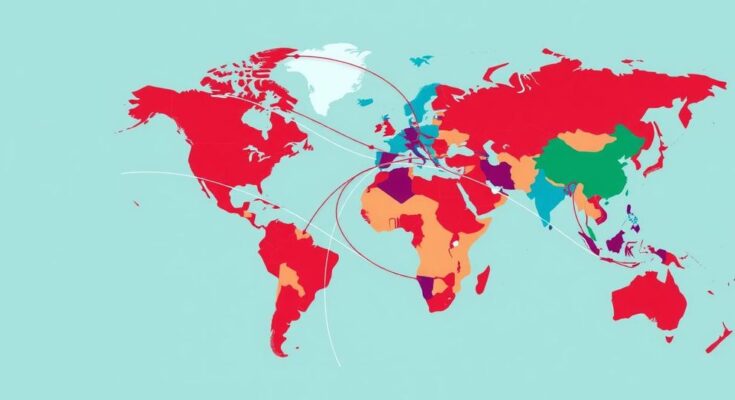China’s diplomatic posture is evolving as it seeks to redefine peace negotiations in the global landscape, emphasizing equal participation for Europe and Ukraine alongside Russia and the U.S. The ongoing Ukraine conflict presents both an economic opportunity and a strategic challenge for Beijing, especially concerning its interests in Taiwan. Concurrently, tensions with the U.S. are escalating, necessitating careful recalibration of China’s foreign policy.
In the intricate realm of global diplomacy, China has articulated its stance through the voice of Lu Shaye, its special envoy for European affairs. He emphasized that Europe and Ukraine should not merely witness peace negotiations but be regarded as equal partners alongside Russia and the United States. This statement reflects China’s discontent with the existing negotiation framework, initially established by leaders such as Trump and Putin, which appears to overlook the perspectives of broader international stakeholders.
Shaye’s declaration underscored the importance of collaborative dialogue in international relations. He firmly stated, “Decisions must be reached through dialogue on equal footing, not dictated by a select few,” highlighting the need for Europe—critically impacted by these discussions—to take an active role rather than assume a peripheral position.
Furthermore, the tone of China’s remarks indicates a significant transformation in its diplomatic posture. Historically, China has maintained a stance of cautious observation in response to global events. However, the shifting dynamics of U.S.-Russia relations compel China to reassess its strategic alignment in the face of a less favorable geopolitical landscape. The era of passive observation appears to be concluding, as China adapts to evolving power relations.
China has capitalized on the ongoing Ukraine conflict to advance its economic interests, engaging in the acquisition of discounted Russian energy resources and providing a variety of goods, including technology, to Russia. Nevertheless, the potential for improved U.S.-Russia relations creates a significant risk for Beijing, as a swift resolution may diminish China’s economic leverage in the region.
China’s leadership is acutely aware that Trump’s strategy to resolve the Ukraine crisis could lead to the re-entry of Western enterprises into Russia, subsequently reducing reliance on Chinese exports. Such developments pose a serious threat to Beijing’s economic strategy, encouraging them to prefer prolonged conflict over rapid peace settlements in Ukraine.
China’s view of the Ukraine conflict is also influenced by its aspirations regarding Taiwan. The successful annexation of Ukrainian territories by Russia may embolden Beijing to pursue similar territorial ambitions, particularly concerning Taiwan, if global acceptance of such actions becomes evident.
China’s foreign policy has traditionally been guided by the metaphor of two fighting tigers and a wise monkey, with China positioning itself strategically in the midst of U.S.-Russia tensions. However, as noted by political analyst Ilya Gerashchenkov, China has observed Russia’s struggles in Ukraine and perceived vulnerabilities in both the U.S. and NATO, stimulating its ambitions to reclaim Taiwan while awaiting further developments between Washington and Moscow.
With the possibility of improved U.S.-Russia relations on the horizon, China is compelled to recalibrate its diplomatic approach, particularly concerning its engagement with the European Union. As tensions with the U.S. rise, the stability of the European economy becomes essential for Beijing, especially as trade hostilities with the U.S. threaten its economic footing.
As these geopolitical tensions escalate, China’s Foreign Minister Wang Yi articulated a clear message to the U.S., urging the abandonment of any illusions regarding its ability to pressure China while claiming to maintain amicable relations. He cautioned that such duplicity would undermine trust and stability in bilateral relations.
The possibility of confrontation is not limited to trade conflicts; it encompasses broader military and ideological tensions. U.S. Defense Secretary Pete Hegseth has also signaled a robust military preparedness in anticipation of rising global challenges. Thus, China faces the pressing task of redefining its strategic positioning to avoid becoming collateral damage in the ongoing power struggle between the U.S. and Russia.
In summary, China is repositioning itself within the global diplomatic landscape, advocating for equitable dialogue in peace negotiations while simultaneously contending with the geopolitical consequences of the Ukraine conflict. By asserting its interests and recalibrating its strategies in response to U.S.-Russia dynamics, China aims to safeguard its economic stakes and territorial ambitions, particularly concerning Taiwan. As tensions escalate with the U.S., China’s approach reflects a pronounced commitment to navigating the evolving challenges in the international order.
Original Source: news.az




